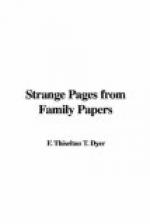And we may cite the case of Matthew Hale, who, on one occasion was instrumental to justice being done through himself appearing in disguise, and supporting the wronged party. It is related that the younger of two brothers had endeavoured to deprive the elder of an estate of L500 a year by suborning witnesses to declare that he died in a foreign land. But appearing in Court in the guise of a miller, Sir Matthew Hale was chosen the twelfth juryman to sit on this cause. As soon as the clerk of the juryman had sworn in the juryman, a short dexterous fellow came into their apartment, and slipped ten gold pieces into the hands of eleven of the jury, giving the miller only five, while the judge was generally supposed to be bribed with a large sum.
At the conclusion of the case, the judge summed up the evidence in favour of the younger brother, and the jury were about to give their verdict, when the supposed miller stood up, and addressed the court. To the surprise of all present, he spoke with energetic and manly eloquence, “unravelled the sophistry to the very bottom, proved the fact of bribery, shewed the elder brother’s title to the estate from the contradictory evidence of the witnesses,” and in short, he gained a complete victory in favour of truth and justice.
FOOTNOTES:
[43] See “Annual Register,” 1813, 1835, and 1842, for similar cases.
[44] See Notes and Queries, 6th Series, X., passim, for “Women on board ships in action”; and “Chambers’s Pocket Miscellany,” “Disguised Females, 1853.”
[45] See “Dictionary of National Biography,” xiv., 485.
[46] Arnold’s “History of Streatham,” 1866, 164-166. An extraordinary case of concealment of sex is recorded in the “Annual Register,” under Jan. 23, 1833. An inquiry was instituted by order of the Home Secretary relative to the death of “a person who had been known for years by the name of Eliza Edwards,” but who turned out to be a man.
CHAPTER XIII.
EXTRAORDINARY DISAPPEARANCES.
“O
Annie,
It is beyond all hope, against
all chance,
That he who left you ten long
years ago
Should still be living; well,
then—let me speak;
I grieve to see you poor and
wanting help:
I cannot help you as I wish
to do
Unless—they say
that women are so quick—
Perhaps you know what I would
have you know—
wish you for my wife.”
ENOCH
ARDEN.




